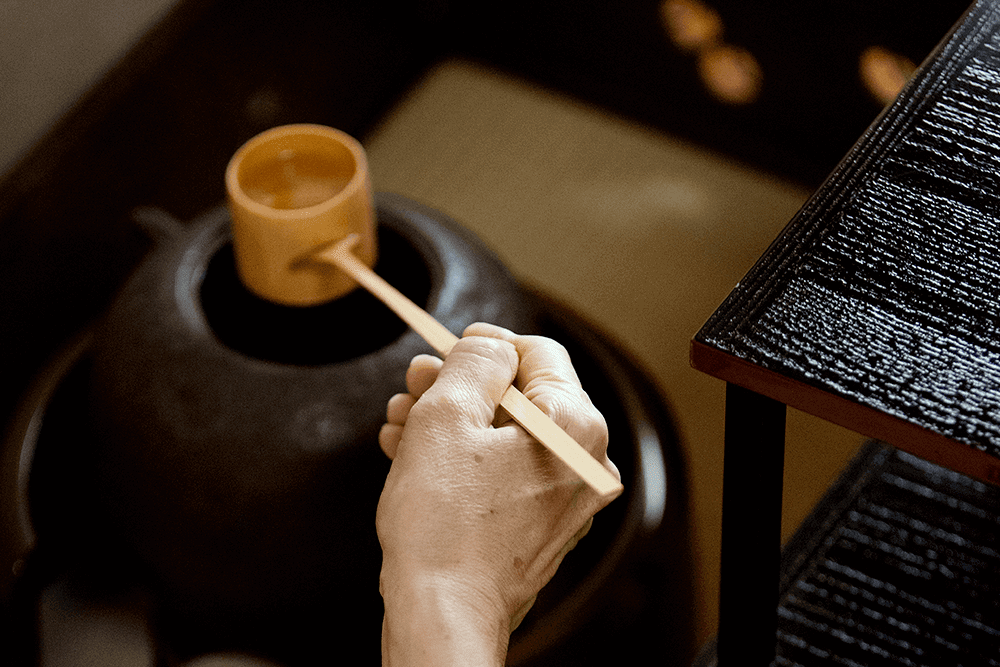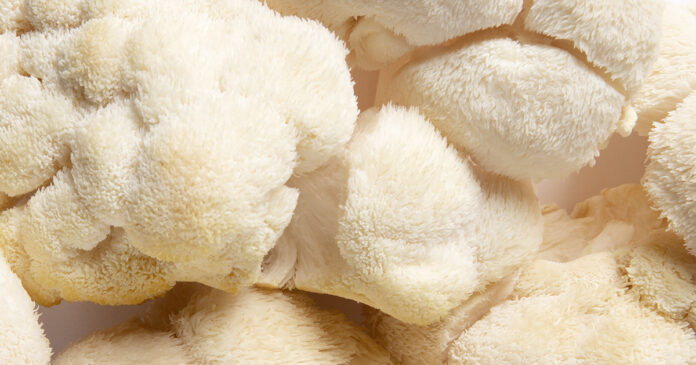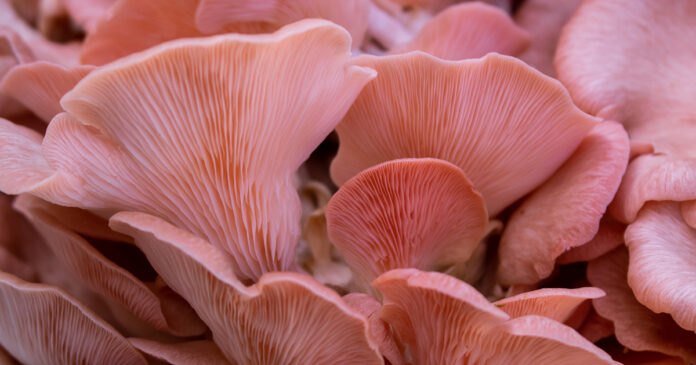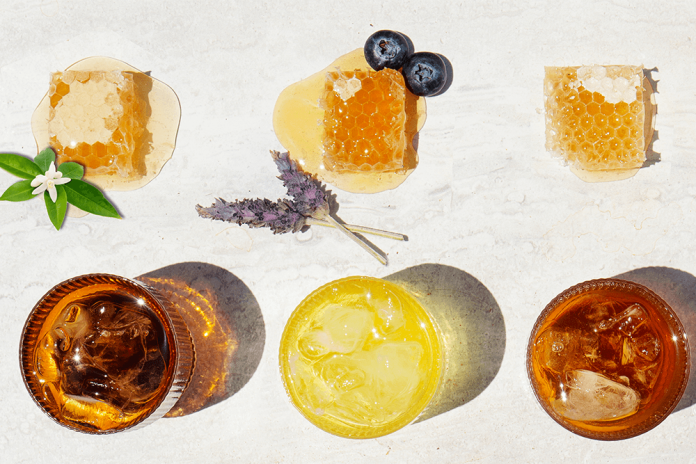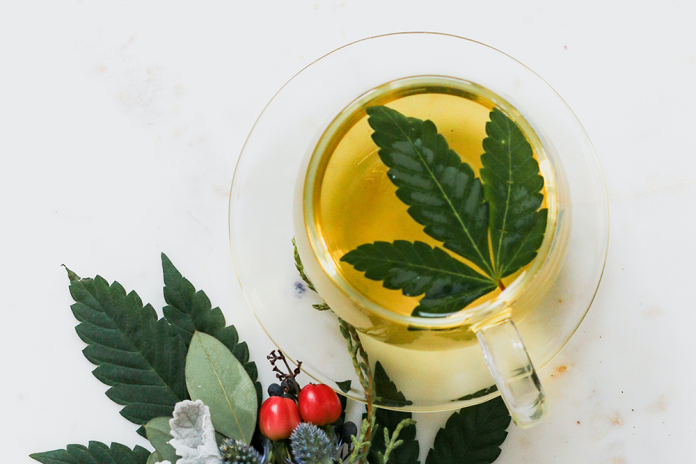Heard of yerba mate tea, but not entirely sure of its history, health benefits, or taste?
We’ll break down what you need to know about this popular beverage, and why you might want to give it a try.
What is Yerba Mate?
Yerba mate is an herbal tea rather than a true tea, meaning it does not come from the Camellia sinensis tea plant.
Rather, it is made from the leaves and stems of Ilex paraguariensis, a species of holly tree that grows natively in the South American Atlantic rainforest, and is farmed in regions across the continent.
The leaves are harvested, blanched (or flash-cooked for a maximum of 3 minutes to stop oxidation), dried and aged for up to 12 months, depending on the producer. The leaves are then ground, rather than left whole like most loose leaf teas. [1]
Traditionally, yerba mate is infused with hot water in a hollowed-out gourd called a calabash. A metal straw with a filter on the bottom — called a bombilla — is used to drink the tea, meaning there’s no need to strain your tisane.
Similar to green tea, yerba mate has a grassy and slightly bitter flavor.
In some cities in South America, it’s not uncommon to see people strolling with calabash in one hand, and a thermos of hot water in the other so they can continually replenish their drink.
As with most tea cultures, yerba mate is meant to be shared and drunk with friends.
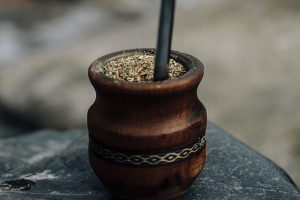
Is Yerba Mate Good For You?
Yerba mate is known for multiple health-boosting properties, most of which are supported by scientific evidence. Here are five research-backed benefits:
1. Rich in Vitamins and Minerals
A cup of yerba mate will provide small amounts of:
- vitamin A
- vitamins B1, B2, B3, and B5
- vitamin C
- vitamin E
- calcium
- iron
- copper
- manganese
- magnesium
- chromium
- phosphorus
- potassium
- zinc
While a daily serving of yerba mate won’t replace a multivitamin — or ideally, the plethora of vitamins and minerals found in whole foods — it can help to boost micronutrient intake and help drinkers meet their daily needs.
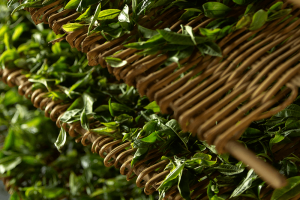
2. May Help Build Stronger Bones
Some research has shown a link between regular consumption of yerba mate and higher bone mineral density.
One study analyzed the spinal bone mineral density (BMD) of 146 postmenopausal women who drank at least 1 liter – or a little more than 4 cups — of yerba mate per day for 4 years, and compared them with 146 women who did not drink the tea. The mate drinkers’ BMD was nearly 10% higher compared to their non-tea drinking counterparts, even controlling for other lifestyle factors. Higher BMD decreases the risk of fractures and can help us stay strong as we age. [2]
Of course, most of us won’t have 4 cups of yerba mate every single day for many years straight, so it’s unclear how meaningful these results are for the average tea drinker. But nonetheless, they show that yerba mate may have a protective effect on bone health.
3. Antioxidant and Anti-inflammatory
Yerba mate contains several different polyphenolic compounds. Three primary categories include saponins, caffeoyl derivatives and chlorogenic acid. Though all work differently, they have the same antioxidant properties — neutralizing free radicals and inhibiting oxidative stress.
Over time, oxidative stress damages healthy cells and can lead to inflammation, which weakens the immune system and can make people more susceptible to illness and infection.
By combatting the effects of oxidative stress, polyphenols help fight inflammation, support the immune system, and can help to reduce risk for a number of health conditions. [3] [4]
4. Revved Up Fat Metabolism
The saponins and caffeoyl derivatives in yerba mate have beneficial impacts on lipid metabolism that may help tea drinkers both burn more fat and maintain healthy cholesterol levels. Saponins have been shown to interfere with the digestion and absorption of fats we get from our diet, which attenuates increases in cholesterol levels. It also helps to prevent excess calories from getting stored as body fat. [1]
In one study, participants with high cholesterol were given three cups of yerba mate tea per day for 40 days, with no other changes to their diet or normal routine. At the end of the study period, their LDL cholesterol (the “bad” kind) dropped by 13% while their HDL (the “good” kind) increased by 6.2% [5].
Caffeoyls derivatives — namely, caffeine — can also help our bodies break down and burn more fat for energy, instead of carbohydrates. [6] This may help to increase endurance and overall exercise performance.
In a study of 14 athletes who took either a yerba mate supplement or placebo before an hour of exercise, the yerba mate group reported lower perceived exertion and greater power output. [7]
What does that mean for the average tea drinker? A regular dose of yerba mate can help our metabolisms work more efficiently, giving us more steady energy for all activities throughout the day.
5. Boosts Energy Levels
Yerba maté tea contains an average of 78 milligrams of caffeine per six-ounce serving, which is on par with the roughly 85 milligrams present in a cup of coffee. Just like any caffeinated beverage, yerba mate can power up energy levels and improve mood. But too much can also cause jitteriness, anxiety and sleep disruption.
Yerba mate also contains two other compounds called theobromine and theophylline in addition to caffeine. These three compounds each impact the nervous system differently by acting on different neurotransmitter receptors, but their cumulative effect is that we experience a steady rise in energy and an overall more pleasant mood, without a sharp crash. [8]
Side Effects: Can you Drink Too Much Yerba Mate?
Some research has linked yerba mate consumption to increased risk for esophageal and oral cancer, though the reasons why are not clear. Other studies have debunked this association, claiming that it’s not yerba mate specifically, but rather scalding hot beverages in general that increase the risk of cancer.
In either case, it’s a good idea to let your tea cool for a minute or two if it’s too hot to drink comfortably, and not to overdo it. A cup or two of yerba mate every once in a while or even daily is likely not enough to cause any adverse effects.
The caffeine content can be dangerous for certain populations, like pregnant women and people with heart disease like high blood pressure or arrhythmias. These groups should limit their caffeine intake or cut it out altogether. For most healthy people, though, yerba mate’s caffeine level does not pose a threat as long as it is consumed in moderation.
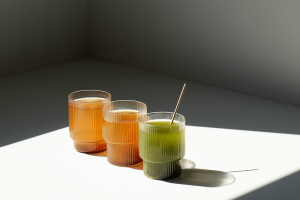
How to Make and Enjoy Yerba Mate
Use about one tablespoon of yerba mate per cup of hot water. If you don’t have the traditional calabash and bombilla, you can steep your mate leaves in a regular teapot — just make sure to use a fine mesh strainer to catch all of the leaf fragments. Using a french press is also an easy way to achieve a tasty and finely filtered infusion.
Since yerba mate can have a bitter taste, many drinkers like to add sugar, honey, agave or some other sweetener. A lemon slice can also help to cut any astringency.
The most important step: share with a friend! Drinking yerba mate has traditionally been considered a social event, and is meant to be made and shared with the special people in our lives.
